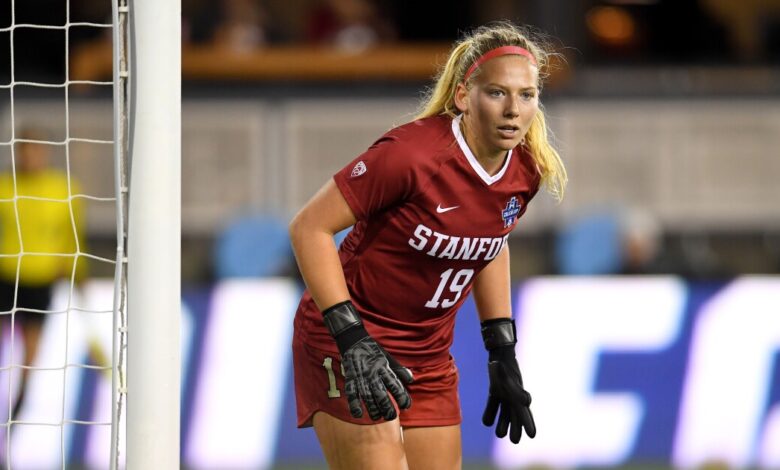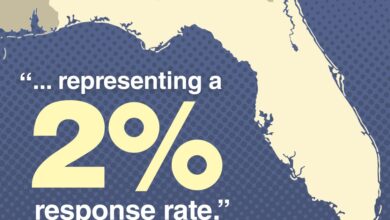A ‘Reckless’ Disciplinary Process Contributed to Stanford Goalie’s Suicide, Lawsuit Says

The family of Katie Meyer, a 22-year-old Stanford University soccer star who died by suicide in March, filed a wrongful-death lawsuit last week against Stanford University. Meyer was found unresponsive in her dorm room days after the university had sent her a disciplinary letter.
“Katie’s suicide was completed without planning and solely in response to the shocking and deeply distressing information she received from Stanford while alone in her room without any support or resources,” states the lawsuit, filed Wednesday in Santa Clara County (Calif.) Superior Court.
The lawsuit maintains that the letter was the main reason Meyer took her life and was a type of “institutional bullying.” Meyer’s death and the resulting lawsuit, student-conduct experts told The Chronicle, signal that student-misconduct investigations should treat both the accuser and the accused with compassion while balancing a university’s legal obligations and a student’s right to due process.
The disciplinary letter, emailed to Meyer one evening in February after university offices had closed, regarded an incident from six months earlier. Meyer had spilled coffee on a Stanford football player while riding her bike, which the university said “resulted in physical injury.” The lawsuit says Meyer thought he had sexually assaulted one of her teammates, a minor at the time. The football player received no disciplinary action for the alleged assault, the lawsuit states.
The disciplinary letter said that the charges could lead to Meyer’s expulsion and that the university would place a hold on her degree, pending the outcome of a hearing, just three months before she was to graduate, causing Meyer undue distress, according to the lawsuit.
Kim Dougherty, a partner at the Justice Law Collaborative and a lawyer representing Meyer’s family, said that the case represents an “egregious and reckless mishandling” of Stanford’s disciplinary process and that the process was selectively used against Meyer.
“From the onset, there was no reasonable basis, nor sufficient evidence, for Stanford to bring such harsh and aggressive disciplinary charges for purported ‘spilled coffee,’” the lawsuit states. “And the threats levied against Katie by Stanford employees were unwarranted, overly punitive, without due care and reckless.”
In a statement, university officials said the claims were “false and misleading.”
“The Stanford community continues to grieve Katie’s tragic death and we sympathize with her family for the unimaginable pain that Katie’s passing has caused them,” the statement said. “However, we strongly disagree with any assertion that the university is responsible for her death.”
The university said that it had responded to the alleged assault, in which “a football player kissed one of Katie’s soccer teammates without her permission.” While the university reported the allegation to its Title IX office and the police, the office did not conduct an investigation since the incident did not meet certain unnamed criteria, according to the university’s statement.
What can we do to hold a student accountable? But also, how are we making sure that they are being taken care of?
The Student Justice Project, a group of Stanford alumni, students, and parents who investigate student-rights violations at the university, criticized Stanford’s denial of blame in Meyer’s death. The group pointed to a 2021 internal investigation that found Stanford’s disciplinary process to be “punitive,” after which the university announced it would reform the system in 2023.
“Stanford has to candidly assess the role they played here, and the damage they have caused to so many other students for over a decade,” Robert P. Ottilie, one of the coalition’s members, said in a written statement.
Patience D. Bryant, president of the Association for Student Conduct Administrators and director of Black/African American equity at San Jose State University, said that while she is not intimately familiar with Stanford’s student-misconduct system, it is not unusual for a university to investigate before deciding to hold a hearing, which might account for the length of time between the incident and the disciplinary letter.
Bryant said that universities are legally required to provide students with a full list of the possible outcomes of any disciplinary investigation.
“They want you to know that these are the possibilities so that you can prepare or the university can support you or your adviser can prepare across all the possibilities,” Bryant said. “We do a disservice when we don’t prepare our students. But what is that line?” The line, Bryant said, between an unbiased investigation and an overly formulaic one that doesn’t take into account the full intricacies of a given situation can be difficult to decipher.
Martha Compton, who has worked in student conduct at several colleges and now works at the higher-education consulting firm Grand River Solutions, said that while colleges must provide a full list of potential consequences, they can include additional context to help students understand the likelihood of different outcomes. She also said universities should be mindful of their language, avoiding “legalese” and making room for compassion and additional resources.
Stanford said the disciplinary letter offered Meyer an adviser and told her she could choose a support person to attend meetings with the community-standards office. The university also said the head of that office told Meyer “several days” before she received the letter that a decision on whether to proceed with a hearing was coming.
While the university said Meyer was given a number to call “for immediate support,” the lawsuit says the university should have conducted a wellness check after she emailed a response expressing her dismay and shock.
According to the lawsuit, the football player did not bring the university case against Meyer and instead wanted to “make amends.” Dougherty, the family’s lawyer, said that was another sign that the case was blown out of proportion and that Meyer “should never have been charged in the first place.”
Bryant said tragic cases like Meyer’s make her and other student-conduct administrators take stock and think further about how the processes can and should be improved to better serve students, especially in light of growing numbers of students with anxiety and other mental-health concerns.
“My heart goes out to that family. The loss of a young person is never easy to take,” Bryant said. “We’re asking ourselves these questions: What can we do to hold a student accountable? But also, how are we making sure that they are being taken care of?”
Compton points out that the pandemic wreaked havoc on student emotional development and shook their support systems. While it doesn’t necessarily apply to Meyer’s situation, she said, students face the greatest difficulties when they feel they have hit a dead end or have no one else to turn to.
“The bigger challenge is helping students build support networks before they ever run into problems,” Compton said. “Some students just don’t know how to connect with people … in times of crisis. The institution can offer all the help in the world, but somebody has to be willing and able to accept.”
Dougherty said one of the goals of the lawsuit is to protect students who face similar situations and ensure that appropriate support mechanisms are in place. Aside from changing the process at Stanford, specifically, Dougherty pointed to Katie’s Save, an organization Meyer’s family created to make sure students don’t have to navigate alarming news and complicated systems on their own. Colleges can employ the system, which allows students to designate a trusted advocate who can be notified on their behalf at potential crisis points — like if a student goes to the emergency room or visits an on-campus mental-health counselor.
“In situations where students may be facing something challenging, they should have the support mechanisms in place,” Dougherty said. “So they’re not alone.”
Source link






